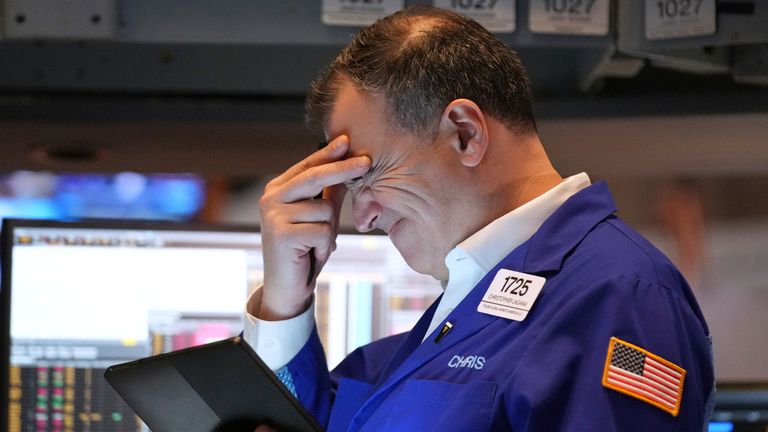
Global stock markets are seeing sharp declines and bitcoin has lost this year’s gains as worries intensify that the AI (artificial intelligence) boom has become a bubble fit to burst.
A small tear has certainly appeared in US tech stocks over the past week, with the tech-heavy Nasdaq closing below a key technical indicator for the first time since late April on Monday.
Key worries include not only high valuations but also vast investment spending in the AI space harming and delaying investor returns.
Money latest: Backlash over £195 beef wellington from M&S
Sharp stock market falls were seen across large parts of Asia and Europe following the retreat on Wall Street.
Japan’s Nikkei 225 shed more than 3% while the Hang Seng in Hong Kong lost 1.7%.
In Europe, the FTSE 100 was down by just over 1% while Germany’s DAX and the CAC in Paris were 1.2% and 1.3% lower in early afternoon dealing.
Nerves are jangling over tech as the market awaits financial results from Nvidia on Wednesday night.
They are likely to be crucial in determining the path for shares ahead.
The world’s largest company by market value is the beating heart of Wall Street’s artificial intelligence boom and any sign of slowdowns, for both revenues and profits, will be catalysts for further sell-offs.
Fears have been growing for months that record values are overdone.
Stocks linked to AI suffered particularly on Monday, building on declines seen last week, and futures indicated more pain to come when trading begins in the US, though drops were expected to be limited.
Financial analysts said baskets of top AI-linked stocks had now entered so-called correction territory, falling more than 10% in short order this month.
Others pointed to an impact on confidence in the crypto market.
Bitcoin, which hit a $125,000 spot rate level only last month, stood at $91,000 on Tuesday.
It had begun the year around the $94,000 level.
Victoria Scholar, head of investment for Interactive Investor, said: “This year was meant to be the year of the bitcoin bulls supported by a highly crypto-friendly administration in the White House and Trump’s ‘less is more’ approach towards regulation.
“However, fears of an AI bubble and concerns about the market’s heavy dependence on a handful of tech giants have caused investors to dial back their exposure to speculative assets such as bitcoin.
“There’s a general sense of nervousness that has captured the market mood lately and bitcoin appears to be in the firing line.”
Wider sentiment has also been harmed by weaker bets on the prospects for a further interest rate cut by the US central bank next month.
Many financial analysts described the stock market shifts as a healthy correction, given all the uncertainties which include the possibility of a US court ruling against Donald Trump’s reciprocal tariffs regime ahead.
Mike Gallagher, director of research at Continuum Economics, told Sky’s US partner CNBC that the market action implies equities could fall about 5% from recent highs – or “a bit more”.
“There’s some things coming over the horizon that make you want to take a bit of risk off the table,” he told the channel’s Squawk Box Europe show.
“So, part of it is just natural pocket taking, part of it is thinking, ‘well, is the macro story going to be perfect? No, it’s not.”
He concluded: “To get a major sell-off, you may need major bad news, and that we haven’t actually got to that point yet.”
In the hour after Wall Street opened, the tech company-heavy Nasdaq Composite had dropped nearly 1.8%.
The S&P 500 US index of companies relied on to be stable and profitable, lost more than 1% and the index of 30 major companies listed on US stock exchanges, the Dow Jones Industrial Average (DJIA), dropped 1.3%.







